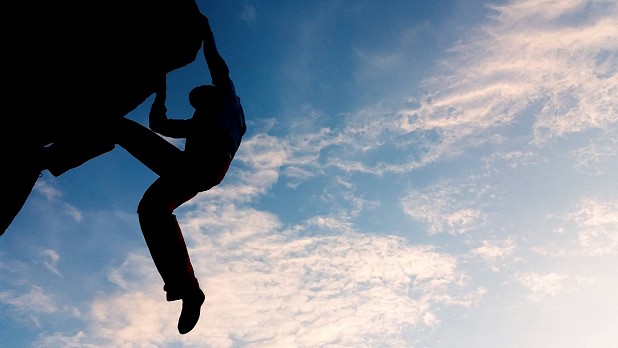
2020: an Olympic year in which Sport Climbing will make its big debut. Not everyone can become an Olympian, but there's nothing to stop anyone from upping their climbing game on rock or on plastic in 2020...
...Made you look! This isn't a training article. Rather than reel off tips for pulling harder in 2020 - since we've had plenty of these in our skills and technique articles this year - we thought we'd do something a bit different and suggest ways to be a 'better' climber towards the environment and others...
Happy New Year from the UKC/UKH/Rockfax Team!
1. Take fewer flights to climbing destinations
Easier said than done for many of us, but if you do your research and are willing to compromise on certain destinations there are ways to avoid flying. Look at trains, buses, and car-sharing options, or if you're really keen for an adventure, get on your bike. Explore the variety of rock climbing that the UK has to offer, which many of us overlook in favour of sunnier and more famous climes. If flying is necessary, can you tag on more activities or add a climbing trip onto a work trip? Can you spend longer periods on fewer trips, rather than darting about on numerous shorter trips abroad? Consider offsetting your carbon footprint. In our UKC Destination Articles in 2020, we will attempt to provide alternative travel options to flying.
2. Support the outdoor community
Start the year off with a good deed and donate to a climbing charity - your local Mountain Rescue, Mountain Heritage Trust, Climbers Against Cancer, ClimbAID or Urban Uprising to name but a few, or donate to your local bolt fund or the BMC's Access and Conservation Trust.
3. Introduce people to climbing
With so many New Year's Resolutions involving fitness and health goals, why not introduce a friend or family member to climbing and help them achieve a goal? Parents, kids and grandparents included! The benefits of climbing for mental and physical wellbeing and health are becoming more well-known as its profile increases. Perhaps you'll earn yourself a new climbing partner at the same time...
4. Make greener outdoor gear choices
Climbing gear and clothing - with their microplastics and in some cases ethical issues - are not generally eco-friendly. The outdoor gear market is expanding and people always want the next best thing in kit or clobber. Some questions to consider when looking at choices are: How is it made and from what? Where was it made? And by whom? The trend for lightweight apparel and equipment has led to less durable products, which inevitably means buying more stuff. Think about how long a product might last, the materials it is made from and the circumstances it was manufactured in (not always easy to track, admittedly) and how far it travelled to get to you.
5. Recycle or donate old gear
It's that time of year when unwanted old gear is getting replaced by the shiny stuff you got for Christmas, or maybe you're following the tidying, sorting and re-arranging trend. Recycle old kit at your local wall, or donate to an outdoor centre, youth group or a friend - as long as it is in safe, working order. Alternatively, if you're feeling creative, repurpose your old gear. Some ideas can be found in this UKC article.
6. Volunteer with a club or organisation
Join a climbing club and get involved in its organisation, or volunteer with Mountain Rescue. Mountain climate research groups such as CREA Mont Blanc seek volunteers to log observations and assist with projects. Become a belayer, judge or general helping hand at local kids' competitions. Find out how on the ClimbScotland or BMC website.
7. Respect the Rock
Do your best to leave things better than you find it at the crag: pick up litter, brush off those tick marks, and have a general tidy-up before you leave. Excessive chalk is unsightly and spoils the onsight challenge for others. Be considerate about toilet etiquette, too.
8. Get involved in a crag clean-up
Organise and/or take part in a clean-up operation at your local crag. Facebook groups are a useful tool for rounding up a group of respectable rubbish-pickers.
9. Ditch single-use plastic bottles
Buy a reusable water bottle or flask instead of buying single-use plastic bottles of water and energy drinks. Most climbers have a Nalgene or similar anyway, but it's worth repeating...
10. Get educated in rescue techniques and first aid
If you are unsure about or lack confidence in self-rescue techniques and first aid skills, take a course to learn or refresh your memory for your own benefit and that of others. Do you know how to call for mountain rescue at home and abroad? How would you handle an injury at the crag before help arrives? Can you carry out a crevasse or avalanche rescue if you'll be heading into the mountains? Can you self-rescue on a sea cliff? P.s.*Put knots in the ends of your ropes when abseiling!*
- SKILLS: Top Tips for Learning to Sport Climb Outdoors 22 Apr
- INTERVIEW: Albert Ok - The Speed Climbing Coach with a Global Athlete Team 17 Apr
- SKILLS: Top 10 Tips for Making the Move from Indoor to Outdoor Bouldering 24 Jan
- ARTICLE: International Mountain Day 2023 - Mountains & Climate Science at COP28 11 Dec, 2023
- ARTICLE: Did Downclimbing Apes help Evolve our Ultra-Mobile Human Arms? 5 Dec, 2023
- ARTICLE: Dàna - Scotland's Wild Places: Scottish Climbing on the BBC 10 Nov, 2023
- INTERVIEW: Loki's Mischief: Leo Houlding on his Return to Mount Asgard 23 Oct, 2023
- INTERVIEW: BMC CEO Paul Davies on GB Climbing 24 Aug, 2023
- ARTICLE: Paris 2024 Olympic Games: Sport Climbing Qualification and Scoring Explainer 26 Jul, 2023
- INTERVIEW: Malcolm Bass on Life after Stroke 8 Jun, 2023

















Comments
I was half expecting this to be ‘pull harder’ but I’m pleasantly surprised! Bravo :)
My first thought on reading the headline was actually in line with your surprise!
It would be great if UKC could feature / promote organisations repurposing old gear or selling gear made from recycled materials. I've got a 30m ripe sitting on the floor of my gear cupboard looking for a new use. I don't need all 30m for a dog lead!
What about car sharing & carbon offsetting?
Car sharing and carbon offsetting are covered in the first topic about flying less.
Below are some articles on those topics:
https://www.ukclimbing.com/articles/features/10_ways_to_creatively_repurpose_old_climbing_gear-7900
https://www.ukclimbing.com/articles/features/money_for_old_rope-8431
https://www.ukclimbing.com/articles/features/holding_on_to_waste_a_very_rubbish_climbing_event-9919
Your local dog trainer may use the rope. One of mine found a home with one.
Steve
Me too. And thanks UKC for this welcomed article.
Car sharing for sure. But the more I read into carbon offsetting the more skeptical I am, especially for flying. As I understand it, there is still a lot of uncertainty on the actual science of carbon sequestration rates from planting trees, restoring peatlands etc. Also the Guardian article in the link illustrates the voluntary off set market can be unreliable in actually being certain that one gets your bang for your buck i.e. the actual amount of global heating your journey creates is offset by the equivalent amount of carbon. But perhaps the most pressing issue is one of equity. The science in the recent IPCC 'Land and climate change reports' shows us that the world doesn't have enough suitable land area to actually grow enough trees or restore enough land to sequester carbon to maintain a liveable global temperature and feed ourselves. So given there is a finite supply of 'offsets' then surely it's better to prioritise these to developing countries to help bring people out of poverty. The science indicates that even with offsets we cannot carry on with our high emitting lifestyles and expect most other people in the world have access to cheap energy they really need right now. So may be the right thing for a climber is simply not to fly.